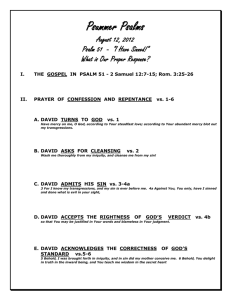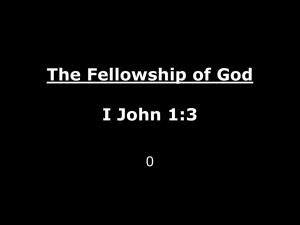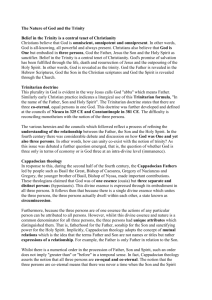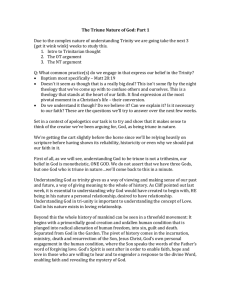TrinitySunday.YrA.May18.2008
advertisement
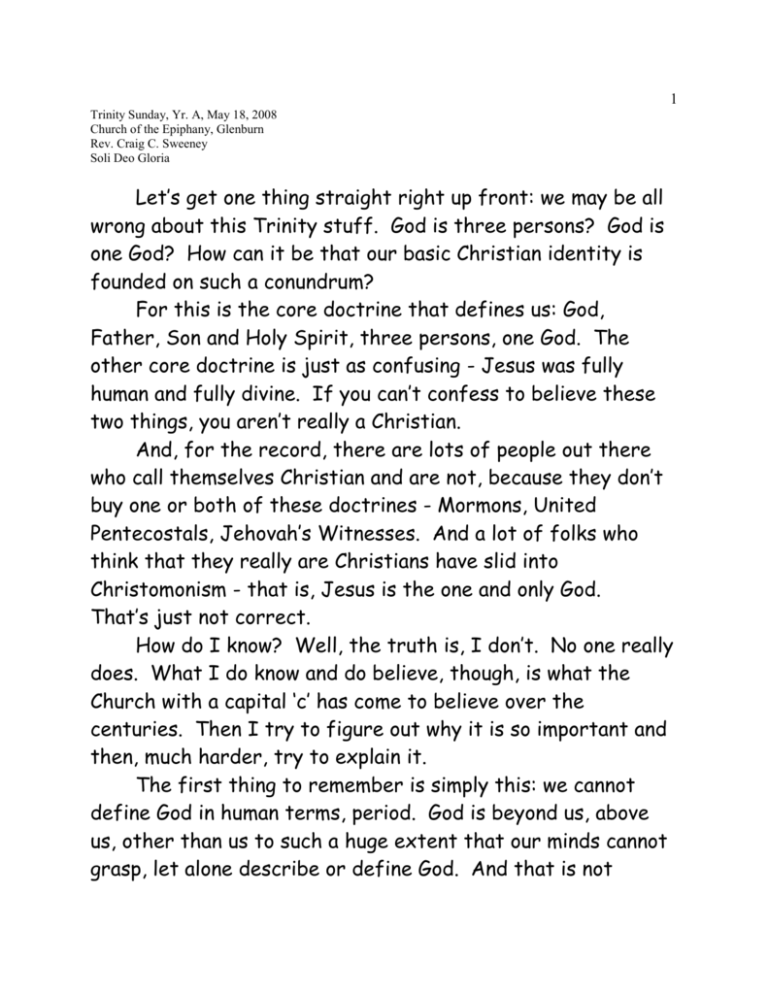
1 Trinity Sunday, Yr. A, May 18, 2008 Church of the Epiphany, Glenburn Rev. Craig C. Sweeney Soli Deo Gloria Let’s get one thing straight right up front: we may be all wrong about this Trinity stuff. God is three persons? God is one God? How can it be that our basic Christian identity is founded on such a conundrum? For this is the core doctrine that defines us: God, Father, Son and Holy Spirit, three persons, one God. The other core doctrine is just as confusing - Jesus was fully human and fully divine. If you can’t confess to believe these two things, you aren’t really a Christian. And, for the record, there are lots of people out there who call themselves Christian and are not, because they don’t buy one or both of these doctrines - Mormons, United Pentecostals, Jehovah’s Witnesses. And a lot of folks who think that they really are Christians have slid into Christomonism - that is, Jesus is the one and only God. That’s just not correct. How do I know? Well, the truth is, I don’t. No one really does. What I do know and do believe, though, is what the Church with a capital ‘c’ has come to believe over the centuries. Then I try to figure out why it is so important and then, much harder, try to explain it. The first thing to remember is simply this: we cannot define God in human terms, period. God is beyond us, above us, other than us to such a huge extent that our minds cannot grasp, let alone describe or define God. And that is not 2 insulting to humankind - we can’t figure out how the brain works, or what memory is, or what is happening as we dream. It is no shame to admit that defining the creator of the universe is beyond us. And this is part of the problem for us as Christians - the world of unbelievers expects us to ‘make sense’ of God to them before they will commit themselves to believing in God. And, deep down inside, we all wish this logic, this rational explanation did exist - it would make all of this so much easier, this faith stuff. We live in a time when we expect things to make sense to us, when we need it to be rational before we take it seriously. But, let’s face it, that is just arrogance masquerading as logical inquiry. It implies that ‘I’ should be able - and indeed am able - to understand everything before I take note of it. Can anyone here explain hunches or intuition? Can anyone tell me why my favorite color is green and my daughter’s is purple? Is it rational for me to love Bach while someone else loves hip hop? And then how about art and our various likes and dislikes? Can we even define time? Most importantly of all, can anyone here explain, rationally explain love? Arguably the most important thing about our being human, love, and it is, so near as I can tell, completely irrational. So when we come down to talking about God, we are dealing with irrational stuff - love, creation, relations, participation, life, grace, forgiveness, salvation. How do we make sense of all of this? How do we explain God? 3 At least we have established doctrine and centuries of brilliant theology to lean on - the Early Church had none of these. What they had was Scripture and memory. And memory was fading fast by the 4th century. That was when the doctrines of the two natures of Jesus and the Trinitarian God were finally decreed by the Counsel of Nicea. Even then it wasn’t finally settled until 200 years later. For that matter, it is safe to say that it still isn’t fully settled today. God - Father, Son and Holy Spirit. This is a description of God, not a definition. It is a formula that reminds us that God is more than just the creator, reminds us that God also came and lived with us in Jesus, reminds us that God’s Spirit was sent to be with us still. It is a metaphor for God, it isn’t the final meaning of God. And I have to confess that I have never been happy with that formula - Father, Son and Spirit. Being a child of today, that immediately implies hierarchy to me - to me a son is by definition subject to his father, not the same as. Many of us have had troubled relations with our fathers and look askance at the very word ‘father.’ To women, it rightly raises the issue of the patriarchy - there is no feminine in that formula and somehow there should be. God is not ‘only’ a male. But I can’t come up with anything better. At times I drift towards ‘modalism,’ that heresy that speaks of the one God appearing in three different ways depending on what he is doing - we skate close to this heresy when we speak of God as 4 creator, redeemer, sanctifier. It is very easy for me to box these aspects of God separately and relate to them that way. But what that does is to deny the essence of God, so near as we can tell, which essence is love, that irrational thing, and unity. God is not three separate gods with different job descriptions, God is one, a unity, who has revealed himself to us in three obvious ways. And so we search Scripture for a way to define, to explain God. And, of course, we do not find the word ‘Trinity.’ Instead we have story after story of how God has revealed himself to his children. I love Genesis, and I never tire of hearing this first chapter we heard this morning. It sounds rather like a litany to me, and I can see a troop of Jewish priests proceeding up the steps to the ancient Temple to the beat of drums as it is recited. In this creation story we hear of the God who creates. We hear that he simply speaks - sends forth his word - and things become. We hear of the wind rushing over the chaos, brooding over the waters, pondering. Here we have Trinitarian thinking - God, the Word of God, and God’s Spirit. All three are involved in creating, all three are active participants - yet they do it as one, they do it in unity. And Paul, who never spoke of the Trinity, closes his letter to the Corinthians today with a recognition of the three persons of God: ‘the grace of the Lord Jesus Christ, the love of God, and the communion of the Holy Spirit be with all of 5 you.’ Three hundred years before Nicea, Paul has recognized that God is somehow revealed in three primary ways. That word that is translated ‘communion’ in Paul’s letter is often translated as ‘fellowship.’ I like that better for to me that word, fellowship, helps me come to grips with the concept of our Triune God. Fellowship bespeaks relationship and - at its deepest and truest level - love. We have so cheapened that word, ‘love,’ that we need to remember that his is not TV love, not soppy poetry love, not romantic novel love we are referring to. It is God love, agape love, love which values the other as much as we value ourselves. True fellowship exists when we have this kind of love for each other. It is one of the oddities of the Church that we ask people to come and join our fellowship and to love people that they might not even like very much. But this is a key thing for Christians, one that, sadly, we aren’t very good at any more - we love each other in spite of ourselves. In this way we mirror God, who loves us - very probably in spite of ourselves! For we all have to admit that we often act in ways that make us un-loveable. Yet God, who is love, loves us anyway. God is in fellowship with us endlessly whether we are paying any attention to God or not. God is love, for God values us as much as he values himself. We see this in all of creation itself given freely to us, we see this is God’s revelations of himself in history, most of all we see this in Jesus’ life, death and resurrection. We feel this still in the presence of God’s Holy Spirit. 6 So this whole Trinity thing is a ham-handed attempt by us humans to make sense of the one God we believe in. The Church argued and fought about it but kept returning to it because it was the best we could come up with. I am personally convinced the Church came to that insight over the course of centuries because the Holy Spirit pushed us to it. I have a hard time imagining God in only one person. Think of it this way - before creation God is, and he/she is all alone. Yet, this God creates the universe, our world and us. To me it takes love to create something - one doesn’t create out of anger or hatred. But what did this lonely God know of love? Love takes three things - the lover, the beloved, and the love itself. If this lonely God was truly all alone, the only thing he could love was himself and if that was the case, why bother to create anything else? Let alone create a world full of creatures that surely cause God pain. And so I find it easier to think of this God as triune lover, beloved, love itself. This God is capable of, indeed truly is, love. That God of love would create because love gives, love creates, love shares, love yearns to be loved back. This triune God does not love only itself, it is three persons in love endlessly. Gregory of Nazianzus, one of the early Church Fathers, used the Greek word ‘perichoriesis’ to describe the relationship that exists within the Godhead - which is yet another theological word that describes the totality of the three persons of God. Perichoriesis literally means to ‘dance around.’ I love that image! Father, Son and Spirt; or lover, 7 beloved, and love; or creator, word and essence - however it works best for you - they are all three endlessly engage in an endless dance of love, joy, creation and sharing. This God of endless joy and love creates because it yearns for yet more love, yearns for more beloveds to love, yearns for the beloveds to love God back. This God of endless joy and love reveals himself to his beloved children so that they will understand what love truly is. This God of endless joy and love comes to live among us as a human being to teach us what love and joy look like in human form. This God of endless joy and love sets us free from slavery to the fear of death and then sends his very essence, his Spirit of love and joy to be with us still and share the Good News. What all of this points to is a God who is active, who participates in life with us, who creates, blesses, forgives, sanctifies and loves - for a God who is not love could not do all of those things. So we speak of the Trinity as we try to describe, not define, God. We speak of a unity of three persons in one God, the lover, the beloved and the love, eternally dancing together and inviting us to dance with them. AMEN
